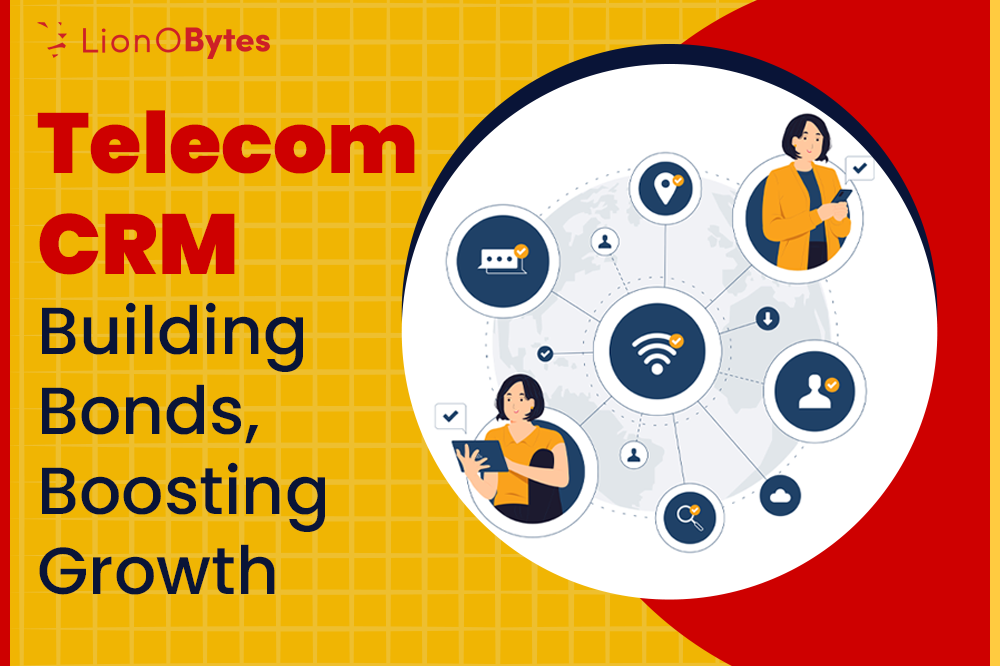
Telecommunications is a necessity in today’s world. CRM is a strategic imperative for modern telecommunications operators. Customers are price-sensitive and have many service options. That is why successful network operators stand out by effectively managing their interactions with subscribers. They do this in a straightforward way, data-driven, and show empathy. This capacity to connect with customers is what keeps them thriving, while others struggle to survive. This blog is about how CRM systems transform customer support, nurture loyalty, and enhance profitability in the telecom industry. It includes technological trends, implementation of best practices, and avoiding mistakes from high-profile deployments. Let's start.
What is CRM in the Telecom Industry
Telecommunications are distinct from many other industries because it combines capital-intensive network assets with a highly personal consumer relationship. Consumers want continuous connectivity, rapid support, and transparent billing. Minor conflicts in any of these domains can create churn.
Enhancing Customer Support: From Ticketing to Predictive Assistance
Telecom CRM software is to professionalize Customer Support. Traditional approaches have relied on manual ticketing systems, long queues, and inactive troubleshooting.
Modern CRM platforms combine service records, network performance telemetry, billing history, and channel interactions into a unified ledger. That allows you to resolve issues faster and smoothly.
Moreover, CRM workflows ensure consistent and informed customer experience. AI support capabilities can predict the reason for an incoming contact from observable signals, enabling intelligent call routing and first-contact resolution.
Practical implementations often combine self-service portals, chatbots, and a human-in-the-loop escalation framework.
Profitability: Benefits of Telecom CRM
The economic argument for CRM for the telecom industry is direct. Reducing churn preserves recurring revenue, and modest improvements in retention can yield outsized effects on lifetime value. These are the main benefits of CRM in telecom. Predictive analytics that identify at-risk customers allow tailored interventions that are less costly than broad marketing campaigns.
Technology Trends Reshaping CRM in Telecom
Several technological currents are reshaping CRM capabilities and expectations. First, the rise of cloud native CRM architectures supports scalability and modularity. This flexibility speeds deployment of new customer experiences and simplifies upgrades.
Second, artificial intelligence and machine learning have matured to the point where predictive maintenance, churn modelling, and conversational interfaces are commercially viable.
Third, real-time data streams from network operations centers and edge telemetry permit CRM systems to react to service anomalies contemporaneously. If a cell site degrades, automated messages can be issued to the affected cohort with estimated resolution times, preempting inbound calls, and preserving trust.
Pitfalls and Cautionary Lessons
CRM implementations are not without hazards. Overreliance on a single vendor, inadequate contingency planning during migrations, and insufficient testing of billing integrations are recurrent sources of failure. The reputational and financial fallout from botched rollouts can be considerable.
Another pitfall is misaligned incentives. If success metrics reward short term acquisition while penalizing the cost of retention, the organization may neglect the very investments that generate long term customer equity. Leaders must design incentive structures that encourage sustainable customer centricity.
LionO360 CRM: Your Partner in Telecom Success

LionO360 CRM offers a suite of services that align with the strategic imperatives described above. The following catalogue maps typical telecom demands concrete offerings that LionO360 can provide.
- Customized deployment of LionO360 CRM to telecom workflows, including custom objects for subscriptions, devices, and network incidents.
- Configuration of sales, service, and marketing modules to reflect operator-specific lifecycle stages.
- Real-time event ingestion from network probes to feed service disruption alerts into the customer ledger.
- Data consolidation and Document Management CRM
- Ongoing data quality services to maintain hygiene and improve model performance.
- Analytics and predictive modeling.
- Implementation of automated workflows, and generative AI assistants to summarize interactions or draft responses for agents.
LionOBytes is one of the most popular names for CRM software providers. You can book your free CRM demo from here. For more information, visit our website or call us at +1 609-281-5272.
Also Read: How Workflow Automation Transforms Sales, HR, and Finance Operations?
Frequently Asked Questions
What is CRM in the Telecom Industry?
CRM in the telecom industry is a strategic imperative for managing interactions with subscribers. It's distinct from other industries due to the combination of capital-intensive network assets and highly personal consumer relationships. Telecom CRM aims to professionalize customer support and meet consumer demands for continuous connectivity, rapid support, and transparent billing.
How does CRM enhance customer support in telecom?
Modern CRM platforms in telecom enhance customer support by combining service records, network performance telemetry, billing history, and channel interactions into a unified ledger, allowing for faster and smoother issue resolution. They move beyond traditional manual ticketing by ensuring consistent customer experience through workflows, utilizing AI for predictive assistance, and integrating self-service portals, chatbots, and human escalation frameworks.
What are the key benefits of using CRM in telecom?
By reducing churn, CRM preserves recurring revenue, as even modest improvements in retention can lead to outsized effects on lifetime customer value. Predictive analytics within CRM can identify at-risk customers, enabling tailored interventions that are more cost-effective than broad marketing campaigns.
What technological trends are reshaping CRM capabilities in telecom?
- Cloud-native CRM architectures: Support scalability, modularity, faster deployment of new experiences, and simplified upgrades.
- Artificial Intelligence and Machine Learning: Enable commercially viable features like predictive maintenance, churn modeling, and conversational interfaces.
- Real-time data streams: From network operations and edge telemetry, allowing CRM systems to react immediately to service anomalies.





